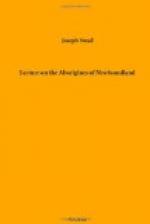The enquiry, however, into the mere origin of a people is one more curious in its nature than it is calculated to be useful, and failure in attempting to discover it need excite but little regret; but it is much to be lamented that the early history of the Boeothick is shrouded in such obscurity, that any attempt to penetrate it must be vain. All that we know of the tribe as it existed in past ages, is derived from tradition handed down to us chiefly thro’ the Micmacs; and even from this source, doubtful and uncertain as such authority confessedly is, the amount of information conveyed to us is both scanty and imperfect. From such traditionary facts we gather, that the Boeothicks were once a powerful and numerous tribe, like their neighbouring tribe the Micmacs, and that for a long period these tribes were on friendly terms and inhabited the western shores of Newfoundland in common, together with other parts of the Island as well as the Labrador, and this good understanding continued until some time after the discovery of Newfoundland by Cabot; but it was at length violently interrupted by the Micmacs, who, to ingratiate themselves with the French, who at that time held the sway in these parts, and who had taken offence at some proceedings of the Boeothicks, slew two Red Indians with the intention of taking their heads, which they had severed from the bodies, to the French. This wanton and unprovoked outrage was discovered by the Boeothicks, who gave no intimation of such discovery, but who, after consulting together, determined on revenge. They invited the Micmacs to a feast, and arranged their guests in such order that every Boeothick had a Micmac by his side; at a preconcerted signal every Boeothick slew his guest. War of course ensued. Firearms were but little known to the Indians at that time, but they soon came into more general use among such tribes as continued to hold intercourse with Europeans. This circumstance gave the Micmacs an undisputed ascendancy over the Boeothicks, who were forced to betake themselves to the recesses of the interior and other parts of the Island, alarmed, as well they might be, at every report of the firelock. What may be the present feelings of the Red Indians, supposing any of the tribe to be yet living, towards the Micmacs we know not; but we do know that the latter cherish feelings of unmitigated hatred against the very name of “Red Indian.”




